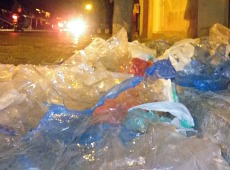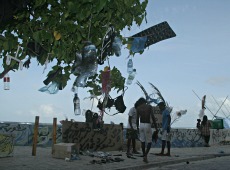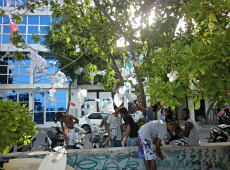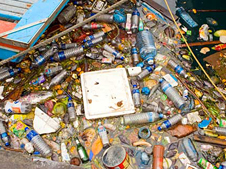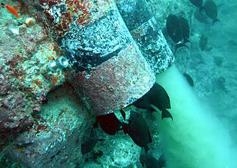Appalled by excessive amounts of garbage littering streets, nearby parks, and sea due to the Male’ night market, local surfers have staged a creative protest using the rubbish to pressure the city council into action.
The night market is held annually before Ramazan to provide people a plethora of affordable goods. Locally referred to as the ‘Ungulhey Bazaar’ – literally meaning the ‘rub up against someone market’ – the 10 day event draws dense crowds, and this year has a record-breaking 765 stalls representing 450 groups, according to local media.
 Thousands of people shopping and eating amidst the hundreds of densely packed stalls generates enormous amounts of waste, which is pitched onto the streets or into the adjacent sea since there are no trash cans.
Thousands of people shopping and eating amidst the hundreds of densely packed stalls generates enormous amounts of waste, which is pitched onto the streets or into the adjacent sea since there are no trash cans.
For the past three years the market has been located near ‘raalhugandu’, Male’s surf point, adjacent to the Tsunami Monument in Henviru ward.
Fed up with the pollution the “surfers against sewage” decided to take action.
“There are no dustbins so the rubbish ends up in the ocean and we don’t want that,” local surfer and Maldives Surfing Association (MSA) Spokesperson Ibrahim Riffath told Minivan News yesterday (June 11).
“It’s very bad, like a real slum,” said Riffath. “The Maldives is one of the most beautiful countries, but the sh*ttiest place.”
The wind carries the waste into the water and spreads it through the streets, so the bad storm that wreaked havoc on Male’ and the night market earlier this week exacerbated the problem, Riffath explained.
The surfers were in good spirits walking through the empty market stalls to collect trash – which was strewn over the ground – to reuse for their protest.
An impromptu improvisation about the waste management problem, sung by local surfer Ibrahim Aman to the tune of Pink Floyd’s the Wall, with accompanying lyrics “we don’t need no trash around us”, made the rubbish hunt a lively affair.
the tune of Pink Floyd’s the Wall, with accompanying lyrics “we don’t need no trash around us”, made the rubbish hunt a lively affair.
As did Aman’s poetry about inserting trash into a bin: “My name is dustbin and I’m always empty. My girlfriend’s name is garbage…”
The random rubbish pieces were arranged along the sea wall, hung from trees in the small park near ‘raalhugandu’, and piled next to protest boards in an artistic fashion.
Witty signs, banners, and graffiti expressed their frustration with the waste management problem: “Is this a pretty picture? Is this heaven on earth? Is this the garbage area? For an independent Dhivehi Raajje (Maldives) we need a clean Dhivehi Raajje.”
The lone trash can located near the park at the night market’s entrance was adorned with graffiti saying “What is this?”, while other ironic messages saying “thank you city council”, “welcome to paradise”, “sunny side” and “carbon neutral 2013”.
 While most of the “surfers against sewage” are MSA members, their protest was not conducted as an official MSA initiative, but was rather spontaneous collective effort.
While most of the “surfers against sewage” are MSA members, their protest was not conducted as an official MSA initiative, but was rather spontaneous collective effort.
“MSA’s president wrote to the city council this year, but we have not yet received a reply,” said Riffath.
“The city council is saying they will have dustbins, but they have not yet done it and no one is coming to collect the trash,” he continued.
“They told us that this place, [the raalhugandu park], is not the road so it’s not part of their mandate to clean,” claimed Riffath.
“We are doing this for ourselves, the public and the environment,” he added. “People aren’t educated about why littering is so harmful.”
Be green and clean
“It’s not nice or hygienic,” local surfer Hamd Abdul Hadhi told Minivan News yesterday.
“Each stall should be responsible for keeping their area clean, daily,” he suggested. “If we were rich we would have bought the dustbins ourselves.”
“Most of the pollution from the market ends up in the sea,” he explained. “The trash hurts the fishes and corals, plus when we’re surfing and get a plastic bag stuck to our faces then we’re in trouble.”
Raising awareness about the link between human and environmental health is necessary to stop people  from haphazardly throwing their garbage everywhere, which is why the surfers are leading by example, Hadhi noted.
from haphazardly throwing their garbage everywhere, which is why the surfers are leading by example, Hadhi noted.
“People are damaging mother nature so much with rubbish,” he said. “As surfers, we understand more than others and want to show people that it is good to be clean.”
“We clean the park and surrounding area two or three times a week, but no one else bothers,” Hadhi lamented. “And every night market we put up notices saying ‘do not litter here’.”
“It’s not just for our benefit, waste management is important for the whole country,” he said. “We are one of the smallest countries, so it’s crazy we can’t manage waste properly.”
“No one listens to us, so this [protest] is all we can do,” he declared.
Male’ City Council
“Of course this is a problem at the night market,” Male’ City Council (MCC) Mayor Ali ‘Maizan’ Manik told Minivan News today (June 12).
“I move around every day early morning and my goodness I know how bad it is,” said Manik.
“My secretary general will be arranging a meeting for this afternoon with the [protest] organisers and we will discuss waste management how we can reach a solution and solve this issue,” he added.
Manik explained that the Environment Ministry has been handling the waste management problem, but has not kept the MCC informed of what they are doing.
“Given the Anti Corruption Commission (ACC) investigation into the [Tatva] contract we were asked to stop [waste management activities] until the inquiry was completed,” said Manik.
“I spoke with the Environment Minister and they are already approved to sign the [new] Tatva agreement, but before the council signs we have to know the changes they have made to the contract,” he noted.
“The Tatva discussion was already held and the original agreement was signed in November 2010,” he continued.
“Changes were already made to the agreement by the International Finance Corporation (IFC) and World Bank, so there shouldn’t be [additional] changes, but the Environment has Ministry altered the contract,” Manik said.
“This is the kind of government we have, doing this to disturb us,” he added. “The waste management agreement should be made to benefit the public.”
Likes (4)Dislikes
(4)Dislikes (0)
(0) 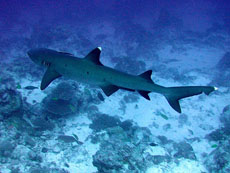 Reefs have been “heavily modified” over the past 30 years – due to the lack of “concurrent precautionary management” – as “resource exploitation has expanded to meet the demands of an increased human / tourist population,” the report added.
Reefs have been “heavily modified” over the past 30 years – due to the lack of “concurrent precautionary management” – as “resource exploitation has expanded to meet the demands of an increased human / tourist population,” the report added. inappropriate atoll development, sedimentation, and pollution were also identified as key threats.
inappropriate atoll development, sedimentation, and pollution were also identified as key threats.